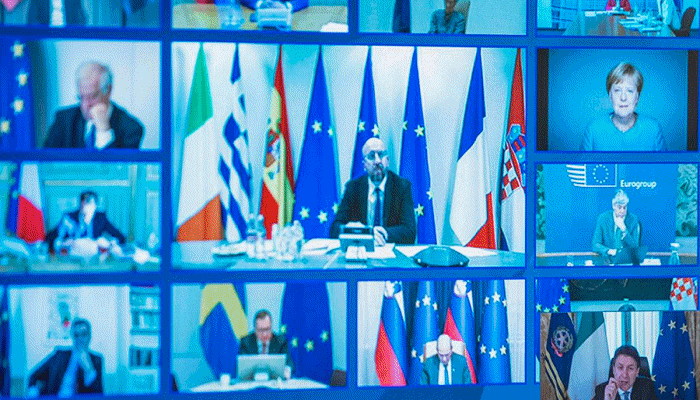EUROPE FINALLY FINDS AN ECONOMIC COMPROMISE AGAINST THE CORONAVIRUS CRISIS |
|
The finance ministers of the 27 had until April 10 to propose a plan to manage the epidemic. The scenario of a deep crisis was taking a little more shape every day within the European Union (EU). Divided on the common economic response to bring to face the consequences of the Covid-19 pandemic, the finance ministers of the euro zone, met Thursday, April 9, 2020, by videoconference have finally found common ground, before another Council of Heads of State and Government. But already, the North-South divide, which nearly imploded the EU in 2010, during the eurozone debt crisis and the rescue of Greece, resurfaced forcefully during the arduous negotiations of the past few days. . 
A recovery was hoped to see Europe come together in imagining collective solutions. The European Union countries finally reached agreement on Thursday on a common economic response to the coronavirus. Common ground was notably found with the Netherlands, which has blocked talks since Tuesday. This vast plan would bring all the measures adopted by the European Union to combat the effects of the pandemic to 3,200 billion euros, the largest in the world. "The meeting ended with the applause of the ministers", announced on Twitter the spokesman for the president of the Eurogroup, Mario Centeno. "Today, we have responded to our citizens' call for a Europe that protects" with "bold proposals that seemed impossible just a few days ago" Bruno Le Maire said that Europe had concluded the most important economic plan in its history. "Everyone had in mind that it was either an agreement or the risk of a European dislocation," he said. German Finance Minister Olaf Scholz greeted him "a great day for European solidarity". "It is important that we all provide a common response that allows our states to overcome the health challenges as well as the economic challenges" created by the Covid-19 pandemic, said the minister. Three main axes The recovery plan to respond to the crisis caused by the Covid-19 pandemic revolves around three axes: 1 ° The European Stability Mechanism (MES) for 240 billion, the European Investment Bank (EIB) up to 200 billion 2 ° The "Sure" plan ("Support to mitigate unemployment risks in emergency") with 100 billion for the benefit of the partially unemployed proposed by the European Commission. "The only condition for accessing MES loans will be to support health spending," said Eurogroup president Mario Centeno on Thursday evening. 3 ° And the stimulus fund to be defined. The heads of state and government, who themselves had failed to reach an agreement at a summit on March 26, will still have to validate these proposals. The stimulus fund and the unresolved question of "corona bonds" The burning issue of "corona bonds", intended to support the economy in the longer term after the crisis, considered less urgent, was not resolved on Thursday. The countries most affected by the virus, in particular Italy, are calling for the creation of a stimulus "fund" which can be financed by common debt, in the form of eurobonds sometimes called "corona bonds" or "eurobonds". However, the pooling of debts constitutes a red line for Berlin and The Hague, which refuse to subscribe to a common approach with the highly indebted States of the South, considered lax in their management. The tea towel was burning in the EU between countries of the South, like Italy and Spain, among the most affected by the pandemic and with fragile finances, and those of the North, led by the Netherlands - leader of the so-called "frugal" states - and by Germany and Austria, supporters of financial control. The first, supported by France and seven other European countries (Greece, Portugal, Slovenia, Belgium, Luxembourg and Ireland, joined since by Cyprus) plead for the creation of a coronabond. While Bruno Le Maire said Thursday that the agreement paves the way for joint debt, his Dutch counterpart Wopke Hoekstra stressed the opposite. “We are and will remain opposed to 'corona bonds'. This concept will not help either Europe or the Netherlands in the long term, "said the Dutch Minister of Economy after the talks. The Eurogroup has not taken any decision concerning these obligations, but the final text mentions a "recovery fund" of which "the legal and practical aspects", in particular the "financing", will still have to be defined by the Heads of State or of government. Towards European solidarity ... This consensus is a relief for Europeans who manage to display unity in the face of the disastrous economic consequences of the virus, after weeks of procrastination highlighting a divide between the countries of the North and those of the South. A unitary response was all the more essential since the European economy is heading towards a deep recession in 2020, the International Monetary Fund even believing that the coronavirus could cause worldwide "the worst economic consequences since the Great Depression" of 1929. Wednesday morning, after 16 hours of discussions, The Hague had been unanimously singled out for its inflexibility, hampering any prospect of agreement on an unconditional activation of this European relief fund MES, created in 2012 for States in difficulty. Member States criticized the Netherlands (supported, according to a European source, by Austria, Sweden and Denmark) for blocking the activation of the European Stability Mechanism (ESM), by strictly conditioning the loans that could be granted by this euro zone relief fund for economic reforms . Blocking the use of the European Stability Mechanism (MES) "because we stubbornly, ideologically, religiously hold on to the implementation of severe conditionality is irresponsible", said Jean-Claude Juncker to the French daily Liberation Such “conditionality”, which would go back to the time when Greece was forced to implement sometimes painful reforms in exchange for new money, would have been experienced as a humiliation by Italy and Spain, both European countries currently most affected by the epidemic. Germany finally proposed to ease the conditions for granting loans. Created in 2012 during the debt crisis and financed by the Member States, the ESM could lend to the States up to 2% of their GDP, or up to 240 billion euros for the whole of the euro zone. For Jean-Claude Juncker, the inflexibility of the Netherlands was all the more incomprehensible since "the MES would not be enough to revive" the European economies. To achieve this, the former President of the Commission supported the creation of a European borrowing capacity, around the issue of "coronabonds". "In December 2010, as President of the Eurogroup, I had proposed the creation of eurobonds so that all members of the euro zone benefit from the same interest rate. But it is necessary to make the difference with the 'coronabonds': it is not a question of mutualizing the national debts of the past, an idea against which half of Europe was raised, but of mutualizing the debt which will arise from the establishment of the budgetary means necessary to respond to the coronavirus crisis, ”he explained. "It is a question of organizing jointly this financing of the current crisis by combining the various instruments: European Investment Bank, MES, European budget and finally 'coronabonds'", he added ... To the question of whether the European Union will survive the crisis, two comments: “The Covid-19 acts as a stress test, headlined the German daily Die Welt at the end of March: it reveals the selfishness of the member states. " The former Finnish Prime Minister Alexander Stubb recalls the three classic phases of the European crises: "First awareness, then chaos and, finally, an imperfect solution." |
|
| Joanne Courbet for DayNewsWorld | |
 |
|



